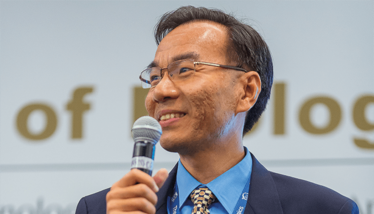Banking on Cell Therapy
Sitting Down With... Steve Oh, Director, Stem Cell Bioprocessing, Bioprocessing Technology Institute, Agency for Science, Technology and Research (A*STAR), Singapore.
Steve Oh |

How did you end up working in the stem cell field?
Science has always been something I loved. As a child, I really enjoyed reading about the universe and the world we live in, but my interests turned towards chemical and biochemical engineering – particularly how cells work. During my university studies, I looked at the issues associated with using animal cells to make antibodies for the biologics industry. After receiving my PhD in Engineering from the University of Birmingham in 1990, I returned to Singapore and ended up focusing on bioprocess optimization in the National University of Singapore’s Bioprocessing Technology unit, with a focus on improving the productivity of antibody production in hybridomas. From there, I jumped to Pall – and it was fascinating to see the bioprocessing industry from the point of view of a vendor. My work with stem cells didn’t start until 2001, when I joined the Agency for Science, Technology and Research (A*STAR) as a principal scientist. At the time, embryonic stem cells had recently been discovered by Jamie Thompson, and my director suggested looking into stem cell bioprocessing. It was a really early time to start focusing on this area – and it was very exciting.
What is your current focus?
The field has changed significantly over the years. Rather than stem cells, researchers and the biopharma industry are now looking at non-stem cells, such as T-cells and immunotherapy, which has also changed how we need to think about bioprocessing. With cell therapies, each patient needs a billion cells – even with 10,000-liter bioreactors it would be challenging to meet those needs. We must work on bioprocess intensification.
Our research initially focused on pluripotent stem cells in 2001, but later we moved into mesenchymal stem cells (MSCs). In the past two years, we’ve moved into immunotherapy. We haven’t published anything in this area yet, but we are preparing a grant proposal to build a self-contained, fully disposable bioreactor that can make personalized cells for 15-20 days.
Our main focus right now is on controlled expansion and controlled differentiation of cells. Once we’ve hit that target, we will work on obtaining good yields, and then use assays to predict how the cell culture will perform in vivo. Developing these assays will be a major challenge over the next five to 10 years.
What is the regulatory viewpoint on cell therapies?
With every medicine – including cell therapies – regulators are concerned about safety. I like to constantly engage with regulators – and I bring them to my labs every quarter to show my progress, and to ask what else I should be thinking about in terms of patient safety. MSCs have been very well received by regulators, despite the fact that it can take time to see results in the clinic. For example, one company in Phase II/III trials using MSCs to help stroke victims recover faster only saw a significant improvement in symptoms one year after administration, which was well outside of the original three-month trial window, but now they are in Phase III trials. If everything goes well, it could be a big win for the field – we are all waiting for more therapies to be approved.
You’ve also founded your own company...
That’s right. There is a huge amount of interest in stem cells right now from the public – and with good reason as I think it’s clear that there is huge potential. In 2015, I founded a company called Brilliant Research, which specializes in the development of stem cell research products, production tools and therapy products. I’d also like to move the company in a new direction by offering personalized stem cell banking. We’ve recently found that we can select stem cells more effectively than using traditional reprogramming methods, and we’re going to work with a company to develop a robotic, automated solution. The aim would be to take a drop of a person’s blood, reprogram the cells into induced pluripotent stem cells (iPCs), and then bank them. The banked cells could then be used years down the line and differentiated into other cell types.
When will the cell therapy field really take off?
The field is full of exciting developments and there are a number of very promising studies that I am keeping my eye on. When I graduated, the big biopharma companies were just starting out with antibody therapies. We’re now at a similar point with stem cells and I think we will start to see a few blockbusters in the coming years, particularly in ophthalmology; for example, using retinal stem cells to treat blindness caused by macular degeneration – we should see results from a study later this year. There have already been promising Phase I studies so if the later stage results are good, I think we’ll see the field really take off because macular degeneration affects so many people. There is also much research on how cell therapies could potentially help diseases like Alzheimer’s and Parkinson’s – but there is a long way to go. Such diseases are highly complex and treating them will not be easy.
Steve Oh is Director of Stem Cell Bioprocessing, Bioprocessing Technology Institute, Agency for Science, Technology and Research (A*STAR), Singapore.



















